UN, US Condemn Seizure Of Ex-US Embassy In Yemen
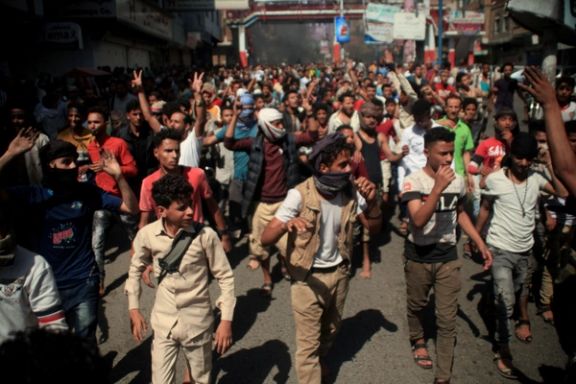
The UN Security Council and the United States have condemned the intrusion and seizure of the now-closed US Embassy in Yemen and the detention of its local staff.

The UN Security Council and the United States have condemned the intrusion and seizure of the now-closed US Embassy in Yemen and the detention of its local staff.
A statement on Thursday approved by all 15 members of the UN's most powerful body called for "an immediate withdrawal of all Houthi elements from the premises" and "the immediate and safe release of those still under detention."
The US embassy in Sanaa has been closed since 2015.
The Security Council stressed that the Vienna convention prohibits any intrusion into diplomatic property as well as the "inviolability" and "immunity" of the premises from searches and requisition — and that property and archives of a diplomatic mission that has been temporarily closed "must be respected and protected."
The council's statement followed a demand on Nov. 17 by the United Nations for the release of two U.N. staffers detained earlier this month by the Yemen rebels.
Yemen has been convulsed by civil war since 2014, when the Iran-backed Houthis took control of the capital, Sanaa, and much of the northern part of the country, forcing the internationally recognized government to flee to the south, then to Saudi Arabia.
Report by AP
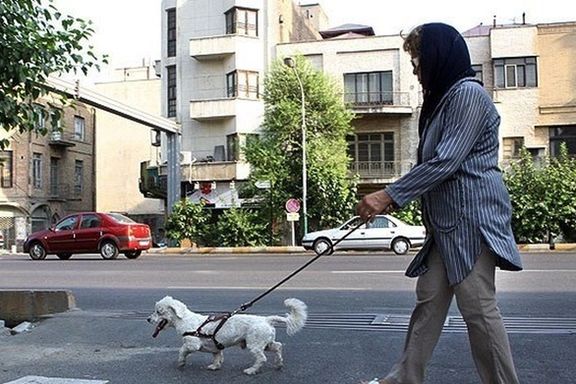
Keeping pets has become a symbol of affluence in Iran, can be dangerous, and should be prohibited, a member of parliament from Esfahan province has suggested.
In a phone interview with Didban-e Iran news website Saturday, Mohammad-Taghi Naghdali defended proposed legislation by claiming a dog had killed children in a Tehran park. But in fact a more real reason for Iran’s conservatives is that keeping dogs is a symbol of Westernization, which they try to prevent.
A bill entitled "Protection of the Public's Rights Against Animals" was put on parliament’s agenda this week with the backing of 75 lawmakers. It would make illegal the buying, selling and keeping “pets” – from dogs and cats to snakes, hamsters, and rabbits.
Naghdali, a mid-ranking cleric and representative of Khomeini Shahr, argued that dogs can cause "serious nuisance and bodily harm to people" when left unattended in shared areas of apartment blocks.
Although the bill names all kinds of pets, even including crocodiles and monkeys, the main concern of parliamentarians is dogs. In July, the Kayhan newspaper called dog walking in cities a "major problem" and urged the judiciary to keep dogs away from public spaces including streets and parks. Tehran City council subsequently banned animals from public places.
Keeping dogs, always common in Iran’s rural areas and on farms, has only in recent years become popular in urban areas as Iranians have kept them as pets, despite occasional police crackdowns, particularly when dogs are spotted in cars. Within Islam, dogs are considered impure and some countries have tight restrictions: Saudi Arabia justifies its strict rules against keeping dogs in terms of the dangers of dogs attacking people, especially children.
Cats have never been a problem and have always been a part of urban and rural life, but the Islamic Republic wants to ban keeping dogs at urban homes.
Iran’s proposed legislation envisages a cash fine of $900-$2,700, with the animal being impounded. It would also oblige estate agents to ban dogs in rental agreements within three months of the law’s passing, with similar fines for non-compliance. Anyone walking a pet in the street could face a three-month jail term, or the confiscation of their car for three months if taking their dog for a drive.
The proposed law is yet another encroachment on citizens’ private life and adds another restriction to a multitude of other bans, such as drinking alcohol, dating, appearing in public without “proper Islamic dress” for women, mixed-gender parties, and singing for women.
Even the conservative Asre-Iran website attacked the proposal November 17 as a waste of parliament’s time. "Who is going to protect people's livelihood?” it asked in a commentary. “Why don't you propose plans for protecting people's assets in the stock market? Or why are you not doing something to increase the value of the national currency?”
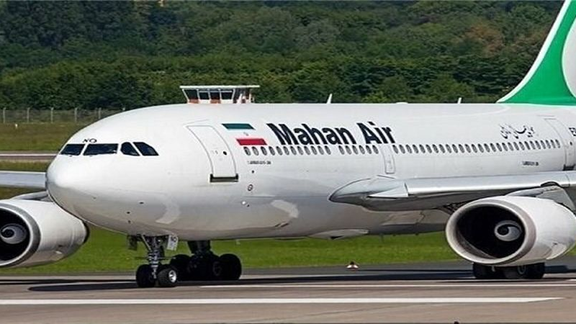
Hackers have disabled the website of a large Iranian airline, Mahan, on Sunday, sending messages to customers claiming they also accessed sensitive information.
A top Mahan Airlines manager confirmed the cyberattack but said this is not the first time hackers have disrupted its computer systems. The company also said all flight operations continue, but the state aviation organization
Meanwhile, a group called Hooshyarane Vatan (Observants of the Fatherland) send text messages to Mahan’s customers accusing the airline of being part of the Islamic Republic’s repressive machine that has killed thousands of protesters and innocent people.
The group also accused Mahan of being part of the Islamic Revolution Guard Corps Quds Force (QF) and claimed to have accessed documents proving that the company was part of IRGC’s “criminal activities”, including money laundering.
The United States sanctions Mahan in 2011 alleging that it served the Quds Force and transported weapons to Syria where Iran has supplied arms and fighters to President Bashar-Assad’s forces in the decade-long civil war.
The group also published texts in English on its Telegram channel, saying, “We’ve found Mahan does keep records of its suspicious business with QF under the name ‘Hamrah’, and that this business is managed by sardar (general) Golparast.” The group added that Golparast is also listed as the owner of Qeshm Fars Air which “is a known QF cover company, frequently used to transport munitions throughout the Middle East.”
Israel and the Islamic Republic conduct hacking operations against one another, but in the past two years, sabotage activities against Iran have expanded, with mysterious explosions and fires at sensitive nuclear, military and industrial sites.
Iran’s Natanz uranium enrichment facility experienced two large explosions, one in 2020 and another earlier this year. Some believe that digital intrusion could be a factor in these successful operations widely attributed to Israel.
The Hooshyane Vatan, that seems to have revealed itself just days ago, in their statements frequently refer to Ahvaz, the capital of the oil-rich Khuzestan province and a favorite label by Iran’s Arab separatists and activists.
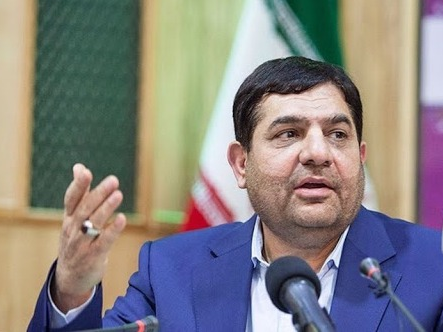
Iran’s first vice president said Sunday that the Islamic Republic has become so powerful no regional or world power can make a decision without Tehran.
Mohammad Mokhber claimed that before the 1979 revolution, Iran was not a player in the regional balance of forces, while now “the Islamic Republic has the first and the last word.”
Before 1979, Iran had the most modern army after Israel in the Middle East and was considered the gendarme of the region. After the fall of monarchy, the Soviet Union invaded Afghanistan in December 1979 and Iraq attacked Iran in September 1980, in what was seen as the result of a serious power vacuum in the region.
Mokhber once again claimed that the IRGC navy seized a Vietnamese-flagged tanker taken by the US Navy in October. The United States had dismissed Iran’s claim and said its navy only observed Iranian forces seizing the tanker in the Sea of Oman.
In other remarks, Mokhber appeared to concede that the centralized economic model of the Islamic Republic has been a failure. “We did not give control of the economy to the people, and we got into trouble,” but he insisted that the Revolutionary Guard’s paramilitary force Basij is the best vehicle to transfer control to the people.

The commander of IRGC's navy says that in clashes with the US Navy 9 of its sailors have been killed, without providing details or timing of any fatal incident.
Admiral Alireza Tangsiri speaking in gathering in on Sunday said the Revolutionary Guard navy had “nine martyrs” in direct clashes with the US Navy but has been able to “slap America nine times”.
He did not elaborate if he was speaking about one incident or several encounters over a period of time, but his reference to slapping America nine times clearly pointed to a string of incidents over several years.
As an example of how Iran slapped America, Tangsiri referred to an incident in October when according to Iran its navy stopped the US “stealing oil from a tanker” and it seized a Vietnamese-flagged vessel and brought to port.
At the time the US said the only incident it observed was Iran seizing a tanker and did its navy did not intervene.
Iran carried on with its claims of victory against the US Navy for a few days, providing conflicting version of the story.
Tangsiri also said that due "some considerations" several clashes between Iran and US forces has never been disclosed.
The US has never reported a serious engagement and trading of fire with the Iranian Navy, except warning shots in the past. In May, a US Coast Guard cutter fired 30 warning shots at two IRGC fast-attack boats. In April also US warships fired warning shots.
Revolutionary Guard speedboats and lately drones and helicopters periodically harass US Navy ships in the Persian Gulf or the Sea of Oman.
During the Trump Administration naval encounters with Iran were common. The only serious incident was in July 2017 when a US warship fired two warning shots at Iranian armed speedboats.
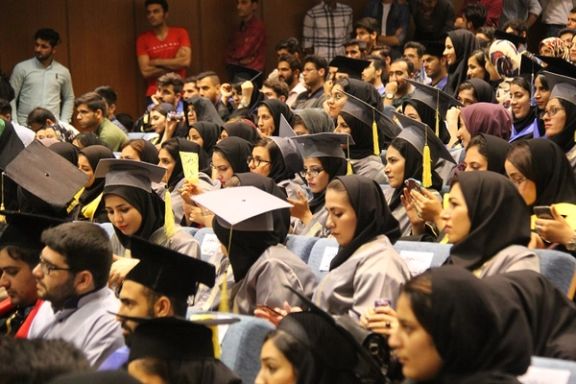
Critics say President Ebrahim Raisi's wrong choice of officials will hurt efforts to attract foreign investment and is prompting talented Iranians to emigrate.
Hossein Kashefi, the former chief of the Parties House, an umbrella organization that regulates relations among political parties, has said in an interview published by Arman newspaper on November 20 that the way Raisi is running the affairs of the state is not likely to instill hope for promising and essential change in Iran.
In recent weeks, many politicians and commentators from across Iran’s political spectrum have begun criticizing the president for inaction as prices rise and more people fall into poverty.
Kashefi said when Raisi was setting up his cabinet before his inauguration in August, only reformists were unhappy about the choices he was making, but now most of the critics of his cabinet's makeup are conservatives, like those who rejected his latest choice for the post of education minister in parliament last week.
Raisi's lack of success in bringing about positive change in people's lives, which is partly because of his wrong appointments, would dissuade foreign investors from coming to Iran, while foreign investment would be crucial in overcoming the current economic crisis, which is what the people want from the president, Kashefi said.
Kashefi added that choosing the right managers and ministers is key to such improvement, but he did not talk about the negative impact of US sanctions on foreign investment in Iran. However, he vaguely pointed out that only an improvement in the country's foreign policy could have prompted foreign investors to show an interest in Iran.
Meanwhile, he pointed out that nepotism in the Raisi administration that appears to be the most important factor leading to choosing the wrong people, and the fact that he has chosen individuals based on their kinship and political affiliation rather than their qualifications has prompted elite executive workforce to leave the country.
Raisi tweeted in response to similar criticisms following the rejection of his latest choice for the Minister of education in a November 17 tweet that he chooses his colleagues "not based on friendship or kinship or under pressure from the media," adding that he chooses his colleagues "based on their qualifications."
Several Twitter users rejected Raisi's argument in their comments. One reader responded: "But your performance and your choices for your cabinet are contrary to this commitment and what you promised in your election campaign. Your cabinet ministers either lack qualifications." Another user commented: "It is probably sheer coincidence that all of your ministers come from the Imam Sadeq University or are the sons-in-law of Tehran Mayor Alireza Zakani."
On the same day, Supreme Leader Ali Khamenei's official Twitter page also posted a tweet that said, "There are elements in some universities who encourage highly talented young persons to leave the country. I say clearly that this is an act of treason."
Users wrote tens of comments that disagreed with Khamenei's view on the reason why young and talented Iranians leave the country for good. One user wrote: "You are the first and last reason why young people leave the country. You have ruined this country."
Another Twitter user wrote: "They will leave their country as long as they cannot get a job unless they have connections with insiders or are the sons-in-law of well-connected people." Many other users referred to two young elite students, Ali Younesi and Amir Hossein Moradi, who have been jailed and tortured on vague political charges. Still another user reminded Khamenei in reference to similar cases: "The real traitors are those who arrest and imprison the talented people for fictitious charges without thinking of the consequences of what they do."